Key takeaways:
- Cannabis edibles affect individuals differently and can take up to two hours to show effects; starting with a low dose is advised.
- The legal status of cannabis edibles varies by state, and federal law still categorizes cannabis as a Schedule I substance, creating confusion for users.
- Common misconceptions include the idea that all edibles have the same effects and that they are harmless; understanding potency and legality is crucial for safe consumption.
- Staying informed through credible sources, engaging with dispensaries, and creating a personal legal checklist can help navigate the complexities of cannabis edibles.
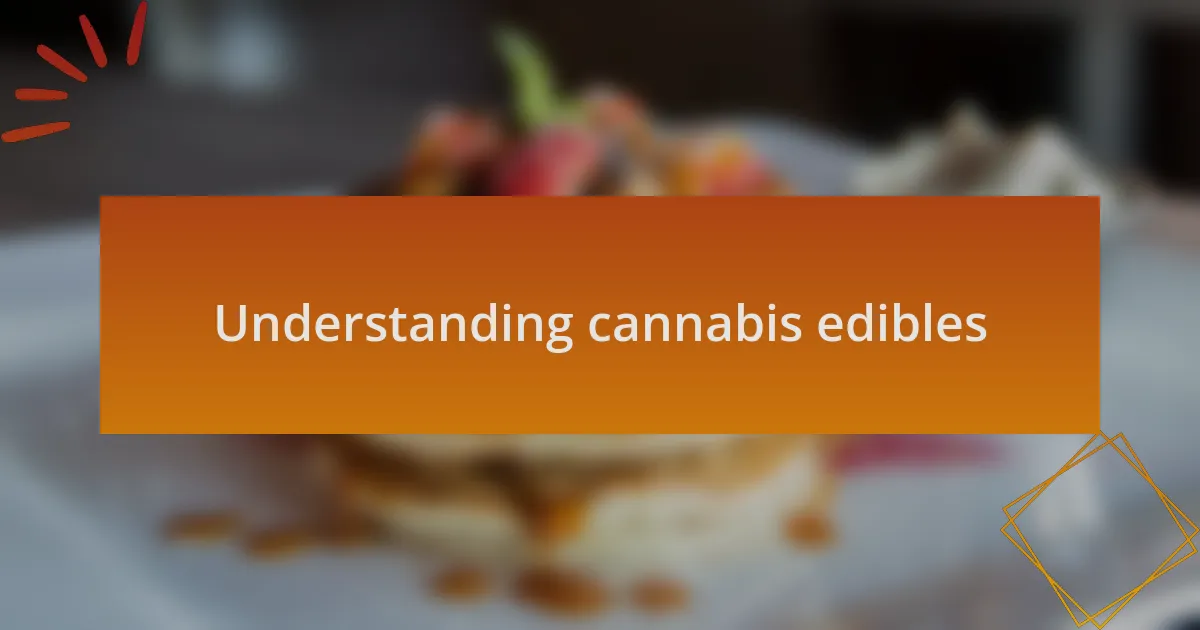
Understanding cannabis edibles
Cannabis edibles are a unique way to experience the effects of cannabis, as they involve infusing food or drinks with cannabinoids like THC or CBD. I remember the first time I tried a cannabis-infused brownie; I was both excited and nervous. How could something so delicious also be so potent?
One thing that’s crucial to understand is that edibles affect everyone differently. For instance, it took me a while to find my ideal dose. Initially, I underestimated their strength, and the effects hit me harder than I anticipated. Have you ever felt out of control from something you enjoyed? That’s the importance of patience with edibles—they can have delayed effects, sometimes taking up to two hours to kick in, which is quite different from smoking.
Another aspect to consider is the variety of edibles on the market. From gummies to infused beverages, the options can be overwhelming. I distinctly recall standing in a dispensary, unsure of what to choose. I asked myself, “Which should I try first?” Exploring different forms and flavors can be part of the fun, but always remember to start low and go slow to find what works best for you.
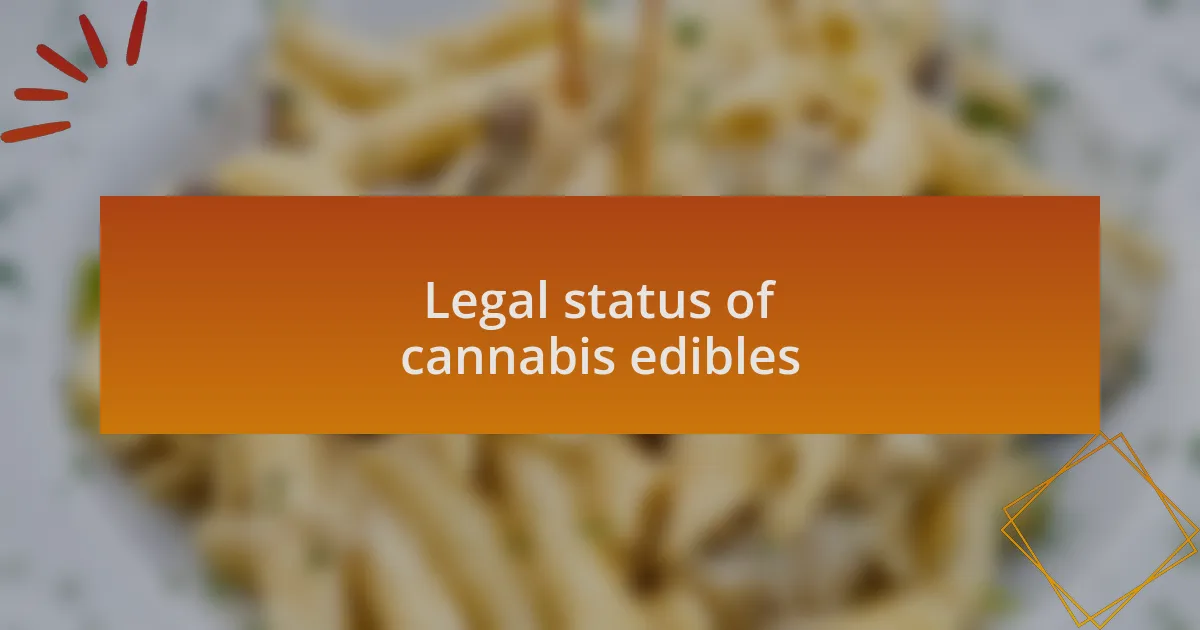
Legal status of cannabis edibles
The legal status of cannabis edibles varies widely depending on where you live. In some states, they’ve become a staple in the legal cannabis market, complete with rules about packaging and potency limits. I remember my first visit to a legal dispensary; they had a specific shelf just for edibles with labels that detailed everything from THC content to recommended serving sizes. This level of transparency made me feel safer when selecting what to try.
However, misconceptions about their legality still persist. For instance, even in states where cannabis is legal, there are often restrictions on driving after consumption. It’s easy to assume that because something is legal, it’s also safe to consume without consequences. I often reflect on how essential it is to stay informed—ignorance can lead to trouble, even in a legal environment.
Interestingly, federal laws can create confusion as well. While individual states might embrace cannabis edibles, the federal government still classifies cannabis as a Schedule I substance. I think this conflicting status creates a gray area that raises questions about interstate travel with edibles. Have you ever wondered how this affects users who want to take their favorite gummies on vacation? It’s a dilemma that requires careful consideration and understanding of local laws.
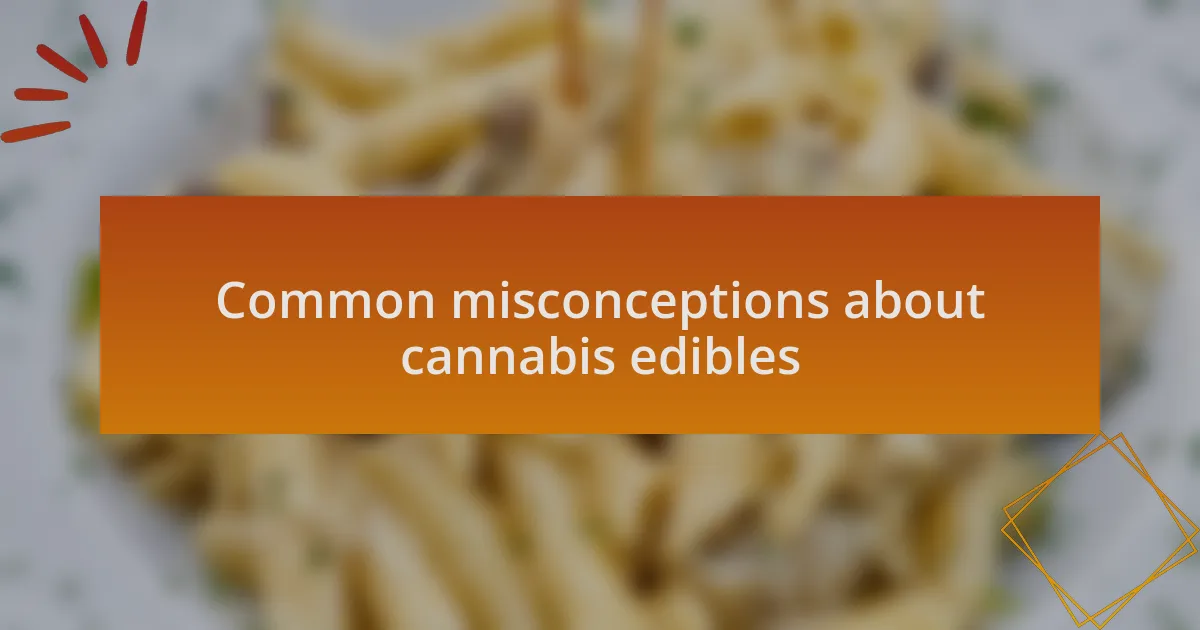
Common misconceptions about cannabis edibles
One common misconception I often encounter is that all cannabis edibles have the same effects regardless of dosage. I remember a friend who recently tried a new cannabis-infused chocolate and took a larger piece than recommended, thinking it wouldn’t be much different from their usual dose. Unfortunately, the result was an intense experience that left them uncomfortable for hours, highlighting the importance of understanding individual tolerance.
Another frequent misunderstanding revolves around the timing of effects. Many people believe that edibles work instantly, but in my experience, it can take anywhere from 30 minutes to two hours to feel the full impact. I recall a time when I was at a gathering, and some guests were eagerly waiting for the edibles to kick in, only to overindulge out of impatience. It’s a great reminder that patience is key, as rushing can lead to a less enjoyable experience.
Finally, some folks think that because edibles are more discreet and enjoyable, they are completely harmless. While they may be easier to consume than smoking, it’s crucial to remember that they can lead to unexpected levels of intoxication. I know this firsthand from a family member who casually enjoyed edibles and discovered that even though it felt like a treat, proper understanding of potency and responsible consumption is vital for a safe experience.
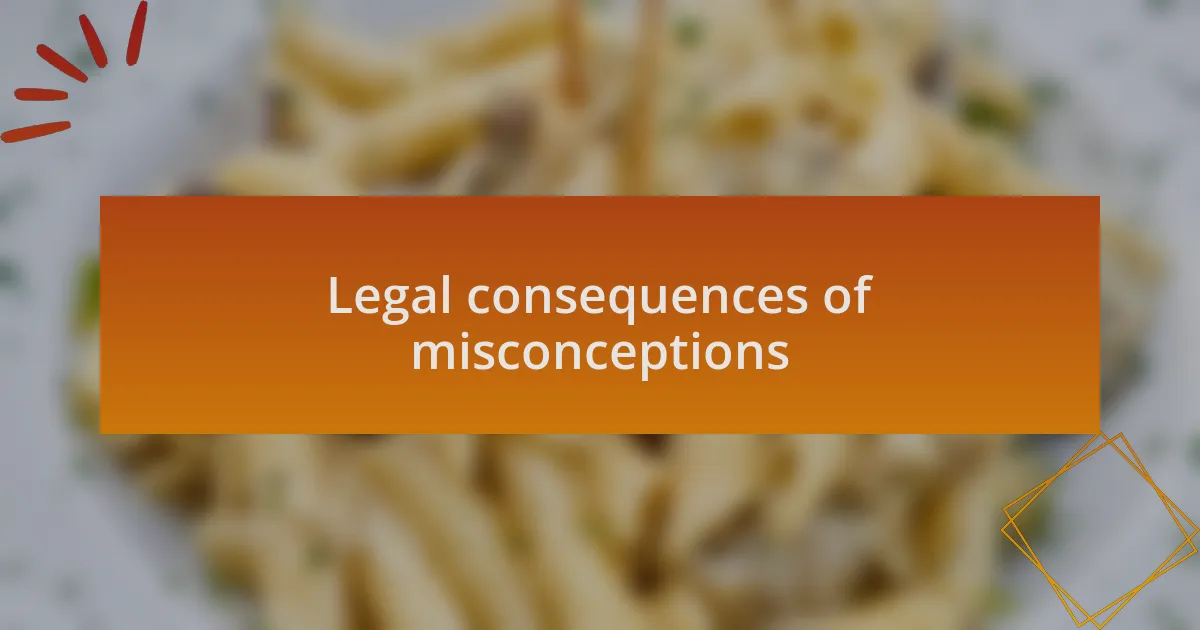
Legal consequences of misconceptions
Misunderstanding the legal implications of cannabis edibles can lead to serious consequences. For instance, when I first moved to a state where cannabis was legalized, I assumed I could freely bring my favorite edibles across state lines. A rude awakening came when I learned that, despite legality in my state, traveling to a neighboring state could lead to hefty fines or even arrest. Have you ever considered how nuanced cannabis laws can be?
Additionally, many individuals believe that cannabis edibles are entirely legal if purchased from a dispensary. However, I encountered a friend who discovered the hard way that while possession might be legal, sharing those edibles at a party could result in legal complications, especially if minors are present. It’s a sobering reminder that the law does not always align with our perceptions, and ignorance can indeed be costly.
Another critical misconception is that edibles are exempt from driving laws. The first time I heard a friend say they could have an edible and drive home, I felt concerned. This misconception not only jeopardizes their safety but also violates DUI laws, which can carry severe penalties. Reflecting on these misconceptions makes me appreciate the importance of staying informed; it can mean the difference between enjoyment and legal trouble.
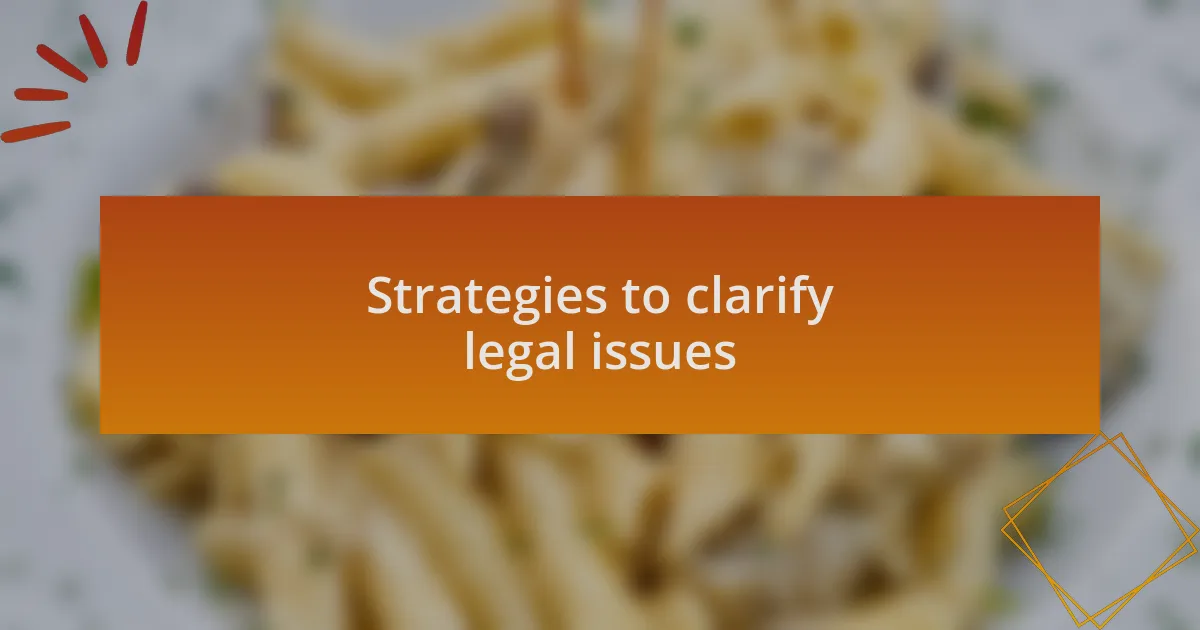
Strategies to clarify legal issues
When it comes to clarifying legal issues surrounding cannabis edibles, one of the most effective strategies I’ve found is staying informed through credible sources. For instance, I began following local cannabis law updates and joined online forums where legal experts share insights. It was eye-opening to see how rapidly laws can change and how misinformation can easily spread. Have you ever thought about the difference a few well-placed questions in these communities could make?
Another technique that worked for me was engaging with dispensaries directly. The staff at these shops are often well-versed in legal guidelines and can provide valuable information. It’s interesting how a simple conversation can reveal nuances that aren’t well-publicized. I remember asking a budtender about sharing edibles at gatherings, and they offered advice that prevented potential issues—definitely saved me from an awkward situation.
Lastly, creating a personal checklist of what’s legal and what’s not in my area has been a game-changer. Every time I plan to enjoy cannabis edibles, I go through my own guidelines, which reminds me to consider things like where I’m taking them and who will be around. I have to admit; it feels empowering to have that knowledge in my back pocket. Have you ever made a list to keep track of legal details? It’s a simple yet practical way to navigate those tricky waters.
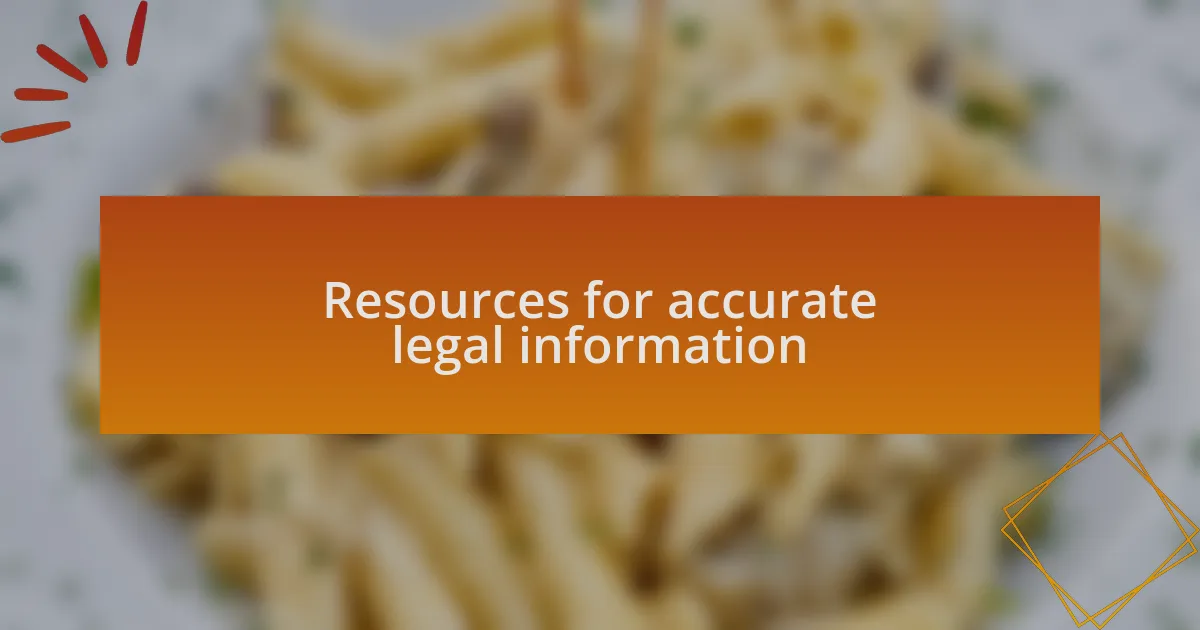
Resources for accurate legal information
When searching for accurate legal information about cannabis edibles, I often turn to government websites and reputable advocacy groups. These sources provide up-to-date information that directly aligns with current laws in my state, making it much easier to understand what’s legal and what isn’t. Have you ever done a deep dive into your local regulations? I was surprised how much clarity I found just by exploring official sites.
I also find value in legal cannabis blogs and podcasts, where professionals discuss regulations in layman’s terms. Listening to experts share their insights can make complicated legal jargon much more digestible. I recall a podcast episode where they broke down recent changes in edible potency laws, which helped me appreciate how such shifts could affect my choices. It’s remarkable how accessible legal knowledge has become!
Joining local community groups is another fantastic way to hear about legal matters from those who’ve navigated the same challenges. I remember attending a meet-up where experienced users shared their stories about legal pitfalls and successes in their consumption journeys. It was reassuring to connect with others facing similar situations, and their advice was invaluable. Have you found a community that supports your learning? It can really change your perspective on legal intricacies.